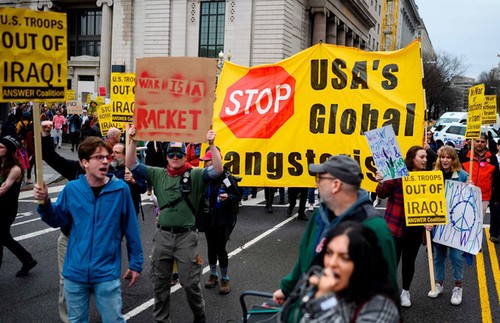 Protests across the US condemn action in Iran and Iraq. (photo: AFP) Protests across the US condemn action in Iran and Iraq. (photo: AFP) |
After the US drone strike killed Iranian military commander Qassem Soleimani in Baghdad last Friday, tension in the Middle East has surged to its highest level prompting a direct confrontation between the US and Iran. Analysts say the US’s air strike was an unprecedented attack on Iran, which can lead to dangerous scenarios.
A small-scale war
Observers say recent developments can prompt a military confrontation at small scale. One presumption is that Iran may target US embassies in the Middle East by organizing large-scale protests or firing artillery and rockets. Tehran may also incite regional militias, who were trained by late commander Qassem Soleimani of the Quds Force, to fight against the US. Tehran may also entice Hezbollah in Lebanon, Palestinian militias, or other forces in attacks against the US vessels and military bases in the Gulf as well as facilities of its allies, Arab Saudi and Israel.
In any circumstance, the US will retaliate and the scale will depend on consequences caused by Iran’s attacks.
An end to Iran’s nuclear deal
The current situation has put an end to final efforts to save the nuclear deal (JCPOA) that Iran signed with 6 world powers in 2015. Once being a historical landmark to ease tension in the US-Iran relations, the deal is close to a collapse.
Iranian officials have said they are considering even harsher steps following the US killing of top general Qassem Soleimani. In a statement, the Iranian government says Iran will no longer abide by any of the restrictions set out in the 2015 nuclear deal in term of the number of centrifuges for uranium enrichment. Tehran will continue to cooperate with the UN nuclear watchdog (IAEA), but will take steps to distance itself from the restrictions of the deal.
If the JCPOA collapses, it will break a forum between Iran and the West and may ignite a global nuclear race.
World oil price hikes, widespread concern of a war
The US-Iran tension may push up the oil prices globally. Analysts of the Eurasia Group told CNBC last Friday that oil prices could make a run at 80 USD if US-Iran conflict intensifies and it will put pressure on large oil consumers and the global economy.
Meanwhile, people around the world are worried about a new war in the Middle East and the US may resume military duty to mobilize more troops to counter Iran. With rising concern that for the first time, their generation would be on the front lines, young American people had checked army duty regulations that crashed the website of the Selective Service System (SSS).
In the Philippines, President Rodrigo Duterte has ordered the army to prepare to evacuate its citizens from Middle East countries. South Korea also has worked out plans to protect its citizens in the region. World leaders have repeatedly called on countries to practice restrain and avoid a war.